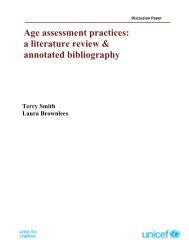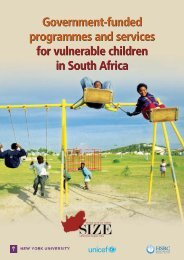Third and Fourth Periodic Report on CRC - Unicef
Third and Fourth Periodic Report on CRC - Unicef
Third and Fourth Periodic Report on CRC - Unicef
You also want an ePaper? Increase the reach of your titles
YUMPU automatically turns print PDFs into web optimized ePapers that Google loves.
C<strong>on</strong>venti<strong>on</strong> <strong>on</strong> the Rights of the Child<br />
"82. Nothing is an offence which is d<strong>on</strong>e by a child under [nine] years of age."<br />
Thus a child under 9 years of age, for example, although he may in comm<strong>on</strong> parlance ‘commit some crime or other’ would<br />
not be prosecuted as he is doli incapax, i.e. incapable of committing crime. A child above 9 <str<strong>on</strong>g>and</str<strong>on</strong>g> below 14 years of age who<br />
has not attained sufficient maturity of underst<str<strong>on</strong>g>and</str<strong>on</strong>g>ing to judge of the nature <str<strong>on</strong>g>and</str<strong>on</strong>g> c<strong>on</strong>sequence of his c<strong>on</strong>duct <strong>on</strong> that occasi<strong>on</strong><br />
would also be exempt from criminal liability [s.83 Penal Code]. The same applies to the mentally disabled. No Court can<br />
assume jurisdicti<strong>on</strong> over any such pers<strong>on</strong> as they do not have the capacity to commit any crime. When the accused is<br />
arraigned he may be found unfit to st<str<strong>on</strong>g>and</str<strong>on</strong>g> trial, in which case he will be removed to the mental hospital <str<strong>on</strong>g>and</str<strong>on</strong>g> the Court has no<br />
discreti<strong>on</strong> in the matter. Thus, although the Court has jurisdicti<strong>on</strong> over the offence, it cannot assume jurisdicti<strong>on</strong> over the<br />
accused until he is found fit to plead.<br />
We may look at another instance where the Court is restricted from assuming jurisdicti<strong>on</strong> even though a crime may have<br />
been committed <str<strong>on</strong>g>and</str<strong>on</strong>g> due process of law will dem<str<strong>on</strong>g>and</str<strong>on</strong>g> prosecuti<strong>on</strong>. When a pers<strong>on</strong> commits an offence, which would<br />
otherwise be triable by a Special Judge under the Criminal Law Amendment Act, 1957, the said Judge will not have<br />
jurisdicti<strong>on</strong> to try him unless the accused is himself a public servant or is being tried al<strong>on</strong>g with a public servant. It is all too<br />
easy to overlook the fact that the jurisdicti<strong>on</strong> of a Court over the accused pers<strong>on</strong> has to be first established before the<br />
criminal process is set in moti<strong>on</strong>. Thus, although the Special Judge has the jurisdicti<strong>on</strong> to try a case where, for example, an<br />
offence under the Preventi<strong>on</strong> of Corrupti<strong>on</strong> Act, 1947 is alleged, he cannot try an accused who is not a public servant or<br />
where a public servant is not being tried at the same trial.<br />
Hence jurisdicti<strong>on</strong> over the pers<strong>on</strong> is a prec<strong>on</strong>diti<strong>on</strong> to the case proceeding to trial by any Court or Tribunal. Once it is<br />
established that a Court has jurisdicti<strong>on</strong> over the accused then <strong>on</strong>ly the Court will go <strong>on</strong> to see whether it has jurisdicti<strong>on</strong><br />
over the offence alleged. Thereafter, the Court will proceed with the trial, if appropriate, <str<strong>on</strong>g>and</str<strong>on</strong>g> then c<strong>on</strong>clude by passing<br />
judgment. C<strong>on</strong>versely, we are faced with the moot questi<strong>on</strong> in this case as to whether the Children Act, 1974 takes away<br />
from the Courts/Tribunals, other than the Juvenile Court, the jurisdicti<strong>on</strong> over children, as defined in that Act, i.e. whether<br />
jurisdicti<strong>on</strong> over neglected/delinquent children is to be exercised exclusively by the Juvenile Court.<br />
After hearing learned Counsel <strong>on</strong> the applicability of the Children Act, 1974 in respect of trial of juveniles or youthful<br />
offenders, we feel the need to explore its relevance <str<strong>on</strong>g>and</str<strong>on</strong>g> precedence or otherwise vis-à-vis other laws of the l<str<strong>on</strong>g>and</str<strong>on</strong>g>.<br />
DEFINITION OF CHILD<br />
A child is defined in secti<strong>on</strong> 2(f) of the Act as a pers<strong>on</strong> under the age of 16 years. Secti<strong>on</strong> 2(n) defines "youthful offender"<br />
as a child who has been found to have committed an offence. We shall see later that many internati<strong>on</strong>al instruments <str<strong>on</strong>g>and</str<strong>on</strong>g><br />
laws of some other countries define a child to be a pers<strong>on</strong> under the age of 18 years. It may be noted that in neighbouring<br />
India the Juvenile Justice Act 1986 defined ‘juvenile’ as under 16 years of age in case of a male <str<strong>on</strong>g>and</str<strong>on</strong>g> under 18 years in case<br />
of a female. Uniformity was brought to prevail by the Juvenile Justice (Care <str<strong>on</strong>g>and</str<strong>on</strong>g> Protecti<strong>on</strong> of Children) Act 2000 where<br />
‘juvenile’ is defined as any pers<strong>on</strong> under 18 years of age. The c<strong>on</strong>cept of Juvenile justice has developed over the last 150<br />
years or more <str<strong>on</strong>g>and</str<strong>on</strong>g> essentially follows the noti<strong>on</strong> that a pers<strong>on</strong> of tender years does not have full c<strong>on</strong>trol over his impetuous<br />
acti<strong>on</strong>s nor the mental maturity to realise the c<strong>on</strong>sequences of his c<strong>on</strong>duct. To put it simply, they do not think in the same<br />
way as an adult <str<strong>on</strong>g>and</str<strong>on</strong>g> are more susceptible to act impulsively without c<strong>on</strong>sidering the severity of the act or the likely end<br />
result.<br />
WHY SPECIAL LAW FOR CHILDREN?<br />
Referring, inter alia, to the (Indian) Children Act, 1960, Krishna Iyer, J. in the case of Hiralal Mallik v. the State of Bihar,<br />
1977 (4) SCC 44, observed as follows:<br />
C<strong>on</strong>ceptually, the establishment of a welfare-oriented jurisdicti<strong>on</strong> over juveniles is predicated <str<strong>on</strong>g>and</str<strong>on</strong>g> over-judicialisati<strong>on</strong> <str<strong>on</strong>g>and</str<strong>on</strong>g><br />
over-form alisati<strong>on</strong> of court proceedings is c<strong>on</strong>tra-indicated. Correcti<strong>on</strong>ally speaking the percepti<strong>on</strong> of delinquency as<br />
145
















